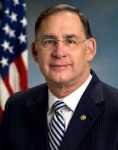- Supporting Americans with Disabilities and Their Families (3/6/25)
- Standing Up for Sportsmenís Access and Safety (2/20/25)
- Bringing Farm Country Voices to Washington (2/12/25)
- A New Front in the Fight Against Prostate Cancer (2/6/25)
- Taking Action to Reverse Immigration Failures and Protect Communities (1/30/25)
- Setting the Agenda for 2025 (1/22/25)
- Making progress for Arkansasís water infrastructure (1/16/25)
Marking Suicide Prevention Month †
In Arkansas, 554 lives were lost to suicide and over 100,000 adults had suicidal thoughts last year, according to the U.S. Centers for Disease Control and Prevention and the Substance Abuse and Mental Health Services Administration. The tragic reality is a growing number of our family, friends and neighbors suffer from mental health conditions and despair that can lead to attempts to take their own lives.
There are steps we can take to tackle this crisis and get our loved ones and others struggling in our communities the help they need.
One is to remove the stigma from disclosing mental health issues and another is to empower those in need of support and treatment to seek it. It’s ok to talk about it –– and doing so can lead to lifesaving outcomes.
This is not just a challenge that affects a particular demographic. It can touch people from all walks of life.
For years, the rate of suicide has been higher in rural America than in urban areas. Farmers and ranchers experience incredible stress, anxiety and pressure in the course of their efforts to plant and harvest each year. Combined with limited access to mental health resources, these factors present a serious risk that leaves too many working and living in farm country as part of the agriculture industry feeling hopeless.
Similarly, our nation’s veterans can often find themselves in dire mental health straits. Those who have deployed in combat zones can bring back invisible wounds of war that manifest in a variety of ways. We know that over 17 former servicemembers die by suicide each day, according to the Department of Veterans Affairs, despite many good faith efforts to get them the outreach and assistance necessary to cope.
These are just two groups among countless others that are susceptible to mental health crises and suicide. The list, unfortunately, goes on and on.
Understanding who is at risk is just one piece, though important, of the larger puzzle to prevent suicide. The next step is to get resources and appropriate care to vulnerable populations. That has been a priority at all levels of government because our society’s awareness of this issue is increasing almost daily.
We’re pushing resources and information out to those in crisis, including through federal and state agencies, establishing programs that seek to leverage successful existing approaches to community support and prevention, and expanding access to mental health care.
The latest example is the creation of the 988 National Suicide Hotline, a quick and convenient way to connect any American who calls or texts this number to a trained crisis counselor. This critical tool can make a difference in the lives of those who are moments away from a tragic decision by providing free, confidential guidance.
Coming together to confront this problem is what it will take to make a difference. September is National Suicide Prevention Month and serves to remind us how urgent it is to find solutions that will improve mental health and reduce the rate of suicide. This month also marks the 21st anniversary of the 9/11 terror attacks, which showed us just how resilient and supportive Americans can be for and with one another.
Join me in pledging to rise to this occasion just as we did then so our family, friends and even strangers know they aren’t alone.
Posting a comment requires free registration:
- If you already have an account, follow this link to login
- Otherwise, follow this link to register

